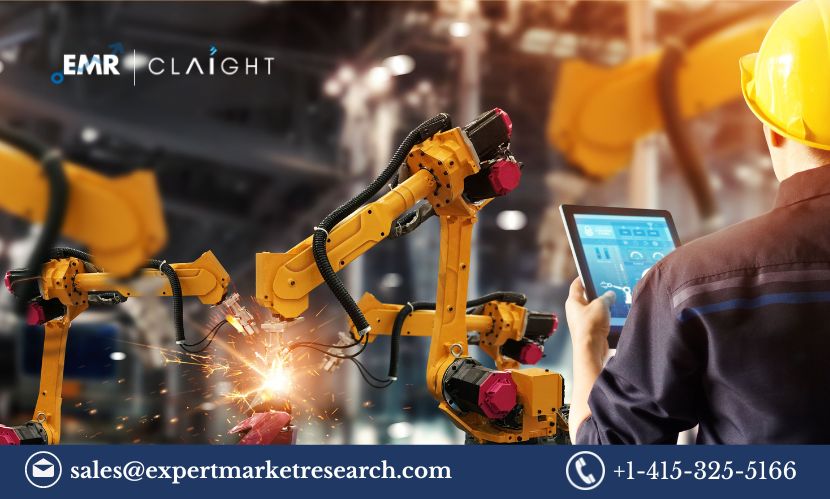Industrial Control and Factory Automation Market Outlook
The global industrial control and factory automation market size reached a value of USD 151.35 billion in 2023. Driven by the rapid adoption of Industry 4.0, advancements in artificial intelligence (AI) and the Internet of Things (IoT), and the rising demand for operational efficiency, the market is projected to grow at a compound annual growth rate (CAGR) of 7.90% between 2024 and 2032, reaching an estimated value of USD 299.24 billion by 2032.
Industrial control and factory automation systems comprise hardware and software solutions designed to streamline and optimize industrial processes. These systems enable automated control over manufacturing and production operations, reduce manual intervention, improve efficiency, and lower operational costs. With technologies such as programmable logic controllers (PLCs), distributed control systems (DCS), supervisory control and data acquisition (SCADA), and human-machine interfaces (HMIs), factory automation plays a critical role in improving productivity, enhancing safety, and reducing the environmental impact of industrial activities.
Key Market Drivers
The primary drivers of the global industrial control and factory automation market include the increasing shift toward smart manufacturing, the rising demand for energy efficiency, and the need for real-time data monitoring. The adoption of smart manufacturing practices is accelerating across various industries, including automotive, aerospace, food and beverages, and pharmaceuticals. Companies in these sectors are increasingly implementing automation systems to boost productivity, achieve consistent product quality, and reduce downtime. The move toward automation is further strengthened by the rising labor costs and shortages in skilled labor, prompting manufacturers to adopt automated solutions as a means of sustaining operations.
Energy efficiency has become a central focus for manufacturers as industries strive to meet sustainability goals and comply with environmental regulations. Automation systems help companies optimize energy use, reduce waste, and lower carbon emissions. For example, industrial robots and automated machinery can perform repetitive tasks with greater precision and less energy than human-operated systems, leading to significant energy savings over time. The ability of factory automation systems to monitor energy usage in real-time allows companies to identify and address inefficiencies, reducing both costs and environmental impact.
Real-time data monitoring and analytics are also transforming the industrial control and factory automation market. Through IoT-enabled sensors and data analytics, companies can collect, analyze, and utilize data from production lines, enabling predictive maintenance and minimizing unexpected breakdowns. Real-time insights into production performance allow manufacturers to make data-driven decisions, optimize resources, and improve overall operational efficiency.
Get a Free Sample Report with Table of Contents@ https://www.expertmarketresearch.com/reports/industrial-control-and-factory-automation-market/requestsample
Technological Advancements Fueling Market Growth
Advancements in artificial intelligence (AI), machine learning (ML), and IoT are propelling the global industrial control and factory automation market. AI and ML algorithms are increasingly being integrated into automation systems to enable advanced capabilities, such as predictive analytics, quality control, and autonomous decision-making. For instance, AI-powered systems can detect anomalies in the production process and suggest corrective actions in real-time, improving product quality and reducing waste.
IoT is playing a crucial role in connecting devices and systems within manufacturing facilities, creating a network of “smart” machinery that can communicate and share data. This connectivity allows for better monitoring and control over production processes, with each component providing valuable insights into its performance and health. With IoT, factory automation systems can identify potential issues before they escalate, enabling predictive maintenance and reducing downtime.
Furthermore, the development of 5G technology is expected to enhance industrial automation by providing faster and more reliable communication between devices. With 5G, automation systems can process data in real-time, facilitating the deployment of advanced applications such as remote monitoring, robotics, and autonomous machinery. The combination of 5G, AI, and IoT is set to revolutionize the industrial control and factory automation market, allowing for unprecedented levels of connectivity, speed, and efficiency in manufacturing operations.
Expanding Applications Across Diverse Industries
The applications of industrial control and factory automation systems are expanding across various sectors, including automotive, pharmaceuticals, energy, and food and beverages. The automotive industry, in particular, has been a major adopter of automation systems due to the complex nature of vehicle manufacturing and the high demand for precision and efficiency. Automation systems in automotive production facilitate tasks such as welding, painting, and assembly, reducing human error and ensuring consistent quality.
In the pharmaceutical industry, automation systems are being implemented to meet strict regulatory standards and enhance production accuracy. Automated systems help pharmaceutical companies maintain sterile environments, track production processes, and comply with Good Manufacturing Practices (GMP). The integration of robotics, automated quality control systems, and advanced data analytics is also improving drug formulation and packaging, making the production process more efficient and less prone to contamination.
The food and beverage industry is another key market for industrial automation, as companies seek to meet the increasing demand for packaged and processed foods while adhering to safety and quality standards. Automation systems in this sector are used for sorting, packaging, labeling, and quality control. Additionally, real-time monitoring systems help food manufacturers maintain consistent product quality and extend shelf life, enhancing customer satisfaction and brand reputation.
Read Full Report with Table of Contents@ https://www.expertmarketresearch.com/reports/industrial-control-and-factory-automation-market
Industrial Control and Factory Automation Market Segmentation
The market can be divided based on component, solution, industry and region.
Breakup by Component
- Industrial Robots
- Machine Vision System
- Process Analyser
- Field Instruments
- Human–Machine Interface (HMI)
- Industrial PC
- Industrial Sensors
- Industrial 3D Printing
- Vibration Monitoring
- Others
Breakup by Solution
- Supervisory Control and Data Acquisition (SCADA)
- Programmable Logic Controller (PLC)
- Distributed Control System (DCS)
- Manufacturing Execution System (MES)
- Industrial Safety
- Plant Asset Management (PAM)
Breakup by Industry
- Process Industry
- Discrete Industry
Market Breakup by Region
- North America
- Europe
- Asia Pacific
- Latin America
- Middle East and Africa
Competitive Landscape
Some of the major players explored in the report by Expert Market Research are as follows:
- ABB Ltd
- Emerson Electric Co.
- Siemens AG
- Mitsubishi Electric Corporation
- Rockwell Automation, Inc.
- Others
Challenges in the Global Industrial Control and Factory Automation Market
Despite its strong growth potential, the industrial control and factory automation market faces several challenges, including high initial costs, cybersecurity risks, and a shortage of skilled personnel. The initial investment required for automation equipment, software, and infrastructure can be substantial, which may deter small and medium-sized enterprises (SMEs) from adopting automation solutions. However, as the technology matures and prices decrease, automation is becoming more accessible to businesses of all sizes.
Cybersecurity is a critical concern in the industrial control and factory automation market, particularly as IoT and connectivity increase the exposure of industrial systems to potential cyber threats. Automated systems often rely on connected networks, making them vulnerable to hacking, data breaches, and malware attacks. Manufacturers are increasingly investing in cybersecurity measures, including firewalls, intrusion detection systems, and encryption protocols, to protect their automation systems and sensitive data from cyber threats.
The shortage of skilled personnel is another obstacle for the automation industry. Operating, maintaining, and programming automated systems require specialized knowledge and technical expertise, which can be challenging to find. Many companies are addressing this issue by investing in employee training programs, developing partnerships with educational institutions, and adopting user-friendly interfaces that make it easier for workers to operate automation systems without extensive technical knowledge.
Future Outlook and Opportunities
The global industrial control and factory automation market is poised for continued growth as industries across the world seek to enhance productivity, reduce costs, and improve sustainability. The trend toward digitalization and smart manufacturing is expected to create new opportunities, particularly in the development of AI-driven analytics, cloud-based automation platforms, and autonomous systems. As more companies adopt IoT-enabled devices and data-driven automation solutions, the demand for secure and scalable automation systems will continue to grow.
Furthermore, the rising focus on sustainability presents an opportunity for automation providers to develop energy-efficient solutions that minimize waste and reduce environmental impact. With an increasing emphasis on carbon reduction and energy savings, the industrial control and factory automation market will play a key role in helping industries achieve their sustainability goals.
Media Contact:
Company Name: Claight Corporation
Contact Person: George buttler, Corporate Sales Specialist – U.S.A.
Email: sales@expertmarketresearch.com
Toll Free Number: +1-415-325-5166 | +44-702-402-5790
Address: 30 North Gould Street, Sheridan, WY 82801, USA
Website: http://www.expertmarketresearch.com
Aus Site: https://www.expertmarketresearch.com.au


